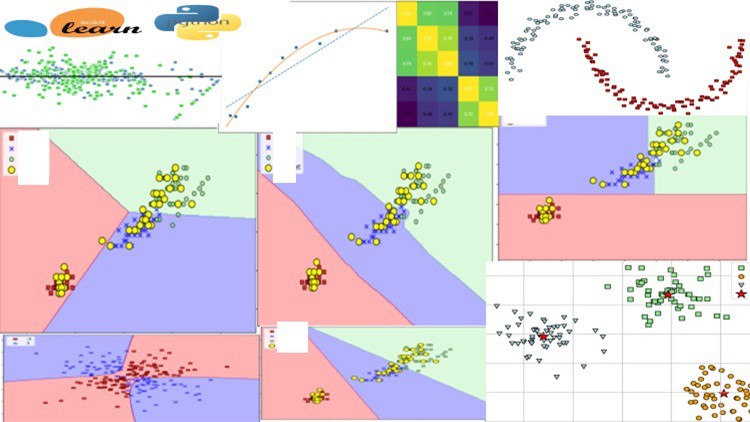Machine Learning with Python: A Mathematical Perspective

Why take this course?
🧠 Master Machine Learning with Python: A Mathematical Perspective 🚀
Welcome to an enriched journey into the world of Machine Learning! This course, designed by the esteemed Dr. Amol Prakash Bhagat, will take you through a rigorous yet engaging exploration of machine learning concepts with a strong emphasis on the mathematical foundations. Whether you're a beginner or looking to deepen your understanding, this course will equip you with the knowledge and skills to build robust machine learning systems using Python.
Course Highlights:
-
Introduction to Machine Learning: Dive into the three main types of machine learning, unravel the basic terminology and notations, and embark on a structured journey through the development of machine learning systems. You'll learn how Python stands out as a versatile tool for implementing these systems.
-
Classification Fundamentals: Explore the early history of machine learning with a glimpse into artificial neurons and their role in perception learning algorithms. Implement adaptive linear neurons and understand the learning process's convergence to solve classification problems effectively.
🔍 Exploring Machine Learning Classifiers:
- Get hands-on experience with scikit-learn, a powerful tool for touring various machine learning classifiers.
- Learn how to choose the right algorithm for your data and walk through training a perceptron from scratch.
- Discover model probabilities using logistic regression and enhance classification capabilities with support vector machines (SVM).
- Navigate nonlinear issues using kernel SVMs, decision trees, and k-nearest neighbors, understanding the nuances of each algorithm.
📊 Data Preprocessing and Hyperparameter Tuning:
- Grasp the importance of building good training sets and the techniques to deal with missing or categorical data.
- Learn how to partition datasets effectively, normalize and scale features for better learning, and identify meaningful features.
- Assess feature importance using random forests and apply dimensionality reduction techniques like PCA and LDA to optimize your dataset.
- Master best practices for model evaluation and hyperparameter tuning to fine-tune your models.
📈 Regression Analysis:
- Predict continuous target variables with linear regression, and explore real datasets like the Housing dataset to apply what you've learned.
- Implement robust regression models using RANSAC and evaluate their performance.
- Understand regularized methods for regression that can help prevent overfitting.
- Transform a linear regression model into a more complex one by employing polynomial regression.
🔗 Clustering Analysis:
- Delve into clustering analysis to understand unsupervised learning and its applications.
- Group objects with similar characteristics using k-means, hierarchical clustering, and DBSCAN.
- Identify patterns in data that may not be explicitly labeled.
🤖 Multilayer Artificial Neural Networks and Deep Learning:
- Uncover the complexities of artificial neural networks and their ability to model complex functions.
- Train an artificial neural network for tasks like classifying handwritten digits, and understand how these networks converge.
- Get introduced to Tensor Flow, a powerful library for parallelizing neural network training, and learn about its performance indicators.
What You'll Learn:
- A comprehensive mathematical perspective on machine learning concepts.
- Practical experience in implementing machine learning algorithms using Python and scikit-learn.
- Techniques for effective data preprocessing, feature selection, and dimensionality reduction.
- Advanced knowledge of regression analysis and clustering techniques.
- An introduction to deep learning with practical examples using Tensor Flow.
Who Should Take This Course:
- Aspiring data scientists who want to build a strong foundation in machine learning with Python.
- Developers and researchers interested in the mathematical underpinnings of machine learning algorithms.
- Students, academics, or professionals who aim to advance their knowledge in this fascinating field.
Embark on your machine learning journey today and transform your understanding with Machine Learning with Python: A Mathematical Perspective. 🌟
Loading charts...